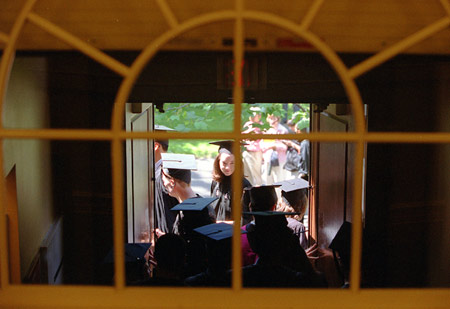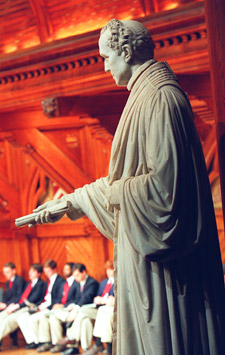‘The age of Ozzy Osbourne’
PBK orator Schama talks of the ‘fate of eloquence’ in a paltry time

As he edged into the main theme of his Phi Beta Kappa oration, “The Fate of Eloquence in the Age of Ozzy Osbourne,” historian Simon Schama divulged some interesting biographical clues to the sources of his own eloquent speaking and writing.
Schama revealed that his “gift of gab” came from his father, a soapbox orator whose motto was “A Jew’s ultimate weapon is his mouth,” but whose own mouth was often bloodied by the fists of British fascist Oswald Mosley’s Black Shirts, against whom he directed his streetcorner oratory.
Schama, who went on a speech strike at the age of 8 after his father tried to recruit him into his own school of political oratory with disastrous results, has taken a less physically hazardous route in exercising his own powers of eloquence. Having taught at Harvard from 1978 to 1993, he is now University Professor of History and of Art History at Columbia University.
His books include “The Embarrassment of Riches: An Interpretation of Dutch Culture in the Golden Age” (1987); “Citizens: A Chronicle of the French Revolution” (1989); “Dead Certainties: Unwarranted Speculations” (1991); “Landscape and Memory” (1995); and “Rembrandt’s Eyes” (1999). Schama has recently completed a 16-part BBC series, “A History of Britain,” and its print tie-in, “A History of Britain: At the Edge of the World, 3500 B.C. – 1603 A.D.” (2000).
Schama went on to evaluate the place of eloquence in American society, contrasting the present age of increasingly faster computers and shorter attention spans with the political rhetoric of 18th and 19th century America.
“All the great orators of the Revolutionary Age,” Schama said, “were famous for their controlled flamboyance. They were hams, but hams for liberty.”
John Quincy Adams, who was known to his contemporaries as “Old Man Eloquent,” once said that “eloquence is power,” while the great abolitionist Frederick Douglass insisted that “Humanity, justice, and liberty demand the service of the human voice.”
Schama contrasted this belief in the power of rhetoric with Lyndon Johnson’s orders to his speech writers: “I want four-letter words and paragraphs four sentences long.”
Although many Americans, in the past as well as the present, have rejected traditional oratory as elitist and artificial, it occupies an essential role in a democratic society, Schama maintained.
Rhetoric implies “the freedom to be persuaded, to be reasoned with, to be moved. Eloquence is by nature tolerant.”
Schama ended by suggesting that perhaps what we need in the 21st century is “public discourse that lies between [Athenian orator] Demosthenes and [star of MTV’s reality show] Ozzy Osbourne, and, above all, a rhetoric that knows, as Lincoln knew at Gettysburg, just when to shut up.”

This year’s Phi Beta Kappa poet was Charles Wright, author of 15 books of poetry and winner of many poetry awards, including the National Book Award, the Academy of American Poets’ Lenore Marshall Poetry Prize, the National Book Critics Circle Award, and the Pulitzer Prize in Poetry.
His poem, titled “Homage to Mark Rothko,” was prefaced with a short prose introduction in which Wright spoke of the stylistic evolution of the abstract expressionist painter, an evolution that mirrored the changing of his name from Marko Rothkowitz.
“When Marko Rothkowitz changed his name and his style,” Wright said, “he lessened the words and abstracted the subject matter. But not the meaning. That got clearer, and wider, and deeper.”
But this refinement of style, said Wright, came at a cost, ultimately driving Rothko to suicide.
“Eventually, his ambition became cosmic,” Wright said, “Inexorably, he had to become the same way. It’s a hard choice when you feel you can’t do what you’ve driven yourself to have to do. Either way, you’ve got to stop. And so he stopped.”
In the poem, Rothko himself speaks, asserting that “I tried their ways for a little while,/But wasn’t at ease with them, they not bringing me to the revealed.”
He ends by saying, “I tried to give form to the formless, and speech to the unspeakable./To the light that shines without shadow, I gave myself.”
Tuesday’s Phi Beta Kappa Literary Exercises celebrated the induction of 96 new members into the Alpha Iota chapter of America’s oldest honor society.
In addition, three Harvard faculty members received Phi Beta Kappa teaching awards. They were: James Engell, the Gurney Professor of English Literature and Professor of Comparative Literature; Howard Georgi, the Mallinckrodt Professor of Physics; and Peter Hall, the Frank G. Thomson Professor of Government.
Three scholars were recognized with honorary membership in the Alpha Iota chapter: Lewis Lockwood, the Fanny Peabody Professor of Music; Stanley Tambiah, the Esther and Sidney Rabb Professor of Anthropology; and Susan Napier, the Mitsubishi Professor of Japanese Studies at the University of Texas at Austin.
An invocation and a benediction by the Rev. Mark Edington bookmarked the event. Musical interludes were provided by the Harvard Glee Club under the direction of Jameson Marvin.
A list of seniors elected to PBK can be found here.




